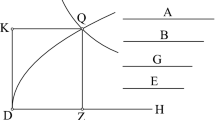Abstract
The aim of this article is to present and discuss the language of the «givens», a typical stylistic resource of Greek mathematics and one of the major features of the proof format of analysis and synthesis. I shall analyze its expressive function and its peculiarities, as well as its general role as a deductive tool, explaining at the same time its particular applications in subgenres of a geometrical proposition like the locus theorems and the so-called «porisms». The main interpretative theses of this study are the following: the language of the «givens» (1) is the standard idiom in which “existence and uniqueness” of a mathematical object was proved, (2) was conceived as an unified framework reducing to a strictly deductive format disparate argumentative steps such as deductions, constructions, and calculations.
Similar content being viewed by others
References
Acerbi F. (2010) Two approaches to foundations in Greek mathematics: Apollonius and Geminus. Science in Context 23: 151–186
Acerbi, F. 2011a. Perché una dimostrazione geometrica greca è generale. In Atti del workshop «La scienza antica e la sua tradizione», eds. F. Franco Repellini and E. Nenci. Milano: LED.
Acerbi F. (2011b) La sintassi logica della matematica greca. Edizioni della Normale, Pisa
Acerbi, F. submitted. Pappus, Aristote et le τóπoς ἀναλυóμϵνoς.
Clagett, M., Moody, E.A. (eds) (1960) The medieval science of weights (scientia de ponderibus). The University of Wisconsin Press, Madison
Federspiel M. (1995) Sur l’opposition «défini/indéfini» dans la langue des mathématiques grecques. Les Études Classiques 63: 249–293
Federspiel M. (2000) Notes linguistiques et critiques sur le Livre II des Coniques d’Apollonius de Pergè (Deuxième partie). Revue des Études Grecques 113: 359–391
Federspiel M. (2008) Le problèmes des livres grecs des Coniques d’Apollonius de Perge. Des propositions mathématiques en quête d’auteur. Les Études Classiques 76: 321–360
Hogendijk J.P. (1986) Arabic traces of lost works of Apollonius. Archive for History of Exact Sciences 35: 187–253
Jones, A. ed. 1986. Pappus of Alexandria, book 7 of the collection, 2 vol. New York: Springer-Verlag.
Jones A. (2001) Pseudo-Ptolemy De Speculis. SCIAMVS 2: 145–186
Michaux, M. 1947. Le Commentaire de Marinus aux Data d’Euclid. Étude critique. Université de Louvain, Recueil de travaux d’Histoire et Philosophie, 3ème série, fasc. 25. Louvain: Bibliothèque de l’université.
Neugebauer, O. 1975. A history of ancient mathematical astronomy, 3 vol. Berlin: Springer-Verlag.
Simson R. (1723) Pappi Alexandrini propositiones duae generales, quibus plura ex Euclidis Porismatis complexus est, restitutae. Philosophical Transactions 377: 330–340
Simson, R. 1776. Opera quaedam reliqua. Glasguae: In Aedibus Academicis.
Taisbak, Ch.M. 2003. ΔEΔOMENA. Euclid’s Data or the importance of being given. Copenhagen: Museum Tusculanum Press.
Tummers, P.M.J.E. ed. 1994. Anaritius’ commentary on Euclid. The Latin translation I–IV. Artistarium Supplementa IX. Nijmegen: Ingenium Publishers.
Vitrac B. (2002) Note textuelle sur un (problème de) lieu géométrique dans les Météorologiques d’Aristote (III.5, 375b16–376b22). Archive for History of Exact Sciences 56: 239–283
Whiteside, D.T. ed. 1967–1981. The mathematical papers of Isaac Newton, 8 vol. Cambridge: Cambridge University Press.
Author information
Authors and Affiliations
Corresponding author
Additional information
Communicated by Bernard Vitrac.
Rights and permissions
About this article
Cite this article
Acerbi, F. The language of the “Givens”: its forms and its use as a deductive tool in Greek mathematics. Arch. Hist. Exact Sci. 65, 119–153 (2011). https://doi.org/10.1007/s00407-010-0072-z
Published:
Issue Date:
DOI: https://doi.org/10.1007/s00407-010-0072-z




